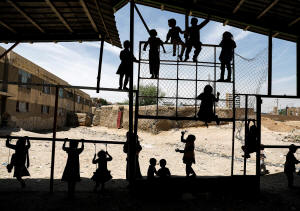A million Afghan children at risk of dying amid acute malnutrition, WHO
says
 Send a link to a friend
Send a link to a friend
 [November 12, 2021]
By Emma Farge [November 12, 2021]
By Emma Farge
GENEVA (Reuters) -Around 3.2 million
children are expected to suffer from acute malnutrition in Afghanistan
by the end of this year, with 1 million of them at risk of dying as
temperatures drop, a World Health Organization spokesperson said on
Friday.
Aid agencies have warned of famine as a drought coincides with a failing
economy following the withdrawal of Western financial support in the
aftermath of a Taliban takeover in August. The health sector has been
hit especially hard, with many healthcare workers fleeing due to unpaid
salaries.
"It's an uphill battle as starvation grips the country," Margaret Harris
told Geneva-based journalists by telephone from the capital Kabul. "The
world must not and cannot afford to turn its back on Afghanistan."

Nighttime temperatures are falling below zero degrees Celsius and colder
temperatures are expected to make the old and the young more susceptible
to other diseases, Harris said. In some places, people are chopping down
trees to provide fuel for the hospitals amid widespread shortages, she
added.
Harris did not have numbers for the number of children who had already
died from malnutrition but described "wards filled with tiny little
children", including with a seven-month old baby whom she described as
"smaller than a newborn".
[to top of second column]
|

Internally displaced Afghan children play outside their shelter,
amid the spread of the coronavirus disease (COVID-19), in Kabul,
Afghanistan May 7, 2020.REUTERS/Mohammad Ismail/File Photo

Measles cases are rising in the country and WHO data
shows 24,000 clinical cases had so far been reported.
"For malnourished children, measles is a death sentence. We will see
so many more deaths if we don't move on this quickly," Harris said.
(Reporting by Emma Farge;Editing by Alison Williams and Toby Chopra)
[© 2021 Thomson Reuters. All rights
reserved.] Copyright 2021 Reuters. All rights reserved. This material may not be published,
broadcast, rewritten or redistributed.
Thompson Reuters is solely responsible for this content.
 |